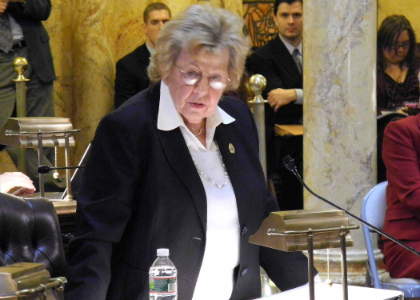
TRENTON – Legislation sponsored by Senate Majority Leader Loretta Weinberg to require employers to provide earned sick leave to workers in New Jersey was approved today by the Senate Labor Committee. If enacted, New Jersey would join three states and more than a dozen towns and cities across the country in working to protect the health of workers and the public.
“Workers who need time off to care for themselves or a family member should not be forced to make the unfair choice between their health and a paycheck. Earned sick leave is a basic workers’ right that should be extended to all employees. It will create a healthier and safer work environment for our residents, but also will protect the health of the public,” said Senate Majority Leader Loretta Weinberg, prime sponsor of the legislation. “Cities across the country, and in our state, have already moved to provide earned sick leave to workers. It’s well past time that we provided a statewide law that protects all of our workers.”
New Jersey would follow Connecticut, California and Massachusetts as states to pass legislation requiring employers to allow workers to earn paid sick leave. An estimated 1.2 million New Jerseyans are unable to earn sick leave, with nearly one-quarter of American adults reporting they’ve lost a job or been threatened with job loss for taking time off due to illness or to care for a sick child or relative. Paid sick days are especially uncommon in certain jobs requiring frequent contact with the public, which has important public health implications. For example, less than a quarter (24 percent) of employees in Food Preparation and Serving Related occupations, and fewer than a third (31 percent) of workers in Personal Care and Service occupations have access to sick days with pay, according to the Institute for Women’s Policy Research.
Workers with annual personal earnings at or below $19,999 are less likely than workers with higher earnings to have paid sick days. Fewer than three out of ten workers (28 percent) in this earnings group are able to take a day off with pay when they are sick, whereas eight in ten workers earning $65,000 or more have access to paid sick days, the Institute for Women’s Policy Research reported.
The bill (S785/A2354) sets a statewide earned sick leave policy; however, it allows earned sick leave policies of municipalities implemented before the bill’s effective date to remain in place if they are more favorable to employees than the policy created under the legislation. The bill would require each employer to provide earned sick leave to each employee it employs in the state. The employee would accrue one hour of earned sick leave for every 30 hours worked. Under the bill, the employer would not be required to permit the employee to accrue at any one time, or carry forward from one benefit year to the next, more than 40 hours of earned sick leave if the employer has less than 10 employees in the state, or more than 72 hours of earned sick leave if the employer has 10 or more employees in the state.
The employer is required to pay the employee for earned sick leave at the same rate with the same benefits as the employee normally earns, except that the pay rate may not be less than the state minimum wage.
Earned sick leave may be used for:
· Time needed for diagnosis, care, or treatment of, or recovery from, an employee’s mental or physical illness, injury or other adverse health condition, or for preventive medical care for the employee;
· Time needed for the employee to care for a family member during diagnosis, care, or treatment of, or recovery from, the family member’s mental or physical illness, injury or other adverse health condition, or preventive medical care for the family member;
· Absence needed due to circumstances resulting from the employee or a family member being a victim of domestic or sexual violence, if the leave is to obtain medical attention, counseling, relocation, legal or other services; or
· Time during which the employee is not able to work because of a closure of the employee’s workplace, or the school or place of care of a child of the employee, by order of a public official due to an epidemic or other public health emergency, or because of the issuance by a public health authority of a determination that the presence in the community of the employee, or a member of the employee’s family in need of care by the employee, would jeopardize the health of others.
The bill prohibits retaliatory personnel actions against an employee for the use or requested use of earned sick leave or for filing of a complaint for an employer violation. It also exempts, from the definition of “employee,” construction employees that are under contract pursuant to a collective bargaining agreement.
“Many employers offer paid sick time to ensure their employees are healthy and productive, but too many people are in jobs where sick days are not available,” said Senator Weinberg. “These workers are in an incredibly vulnerable situation. If they fall ill, they are forced to choose between their health and their paycheck. If a loved one gets sick, they have to decide whether to take time off to care for them, or to pay the rent, the electric bill or to buy groceries. It’s time to give workers the protections they deserve by guaranteeing a minimum standard of sick leave for all workers. By doing so, we will better protect the health and wellbeing of employees and consumers in our state.”
The committee approved the bill by a vote of 3-2. The bill heads next to the full Senate for consideration.

